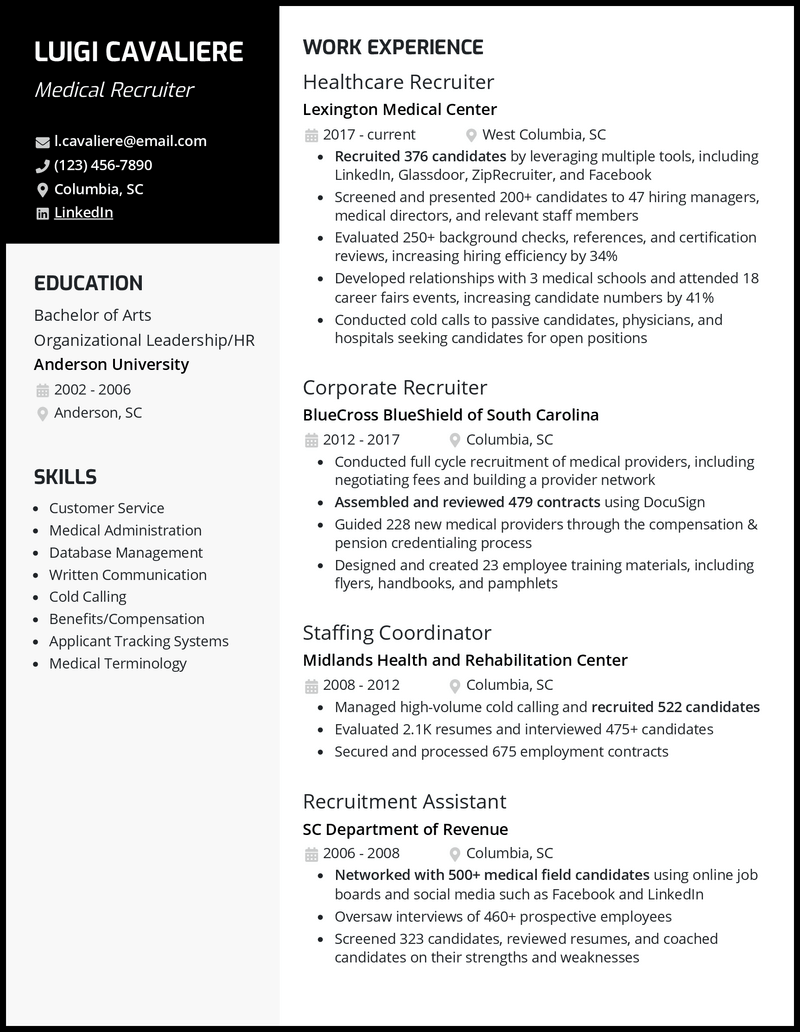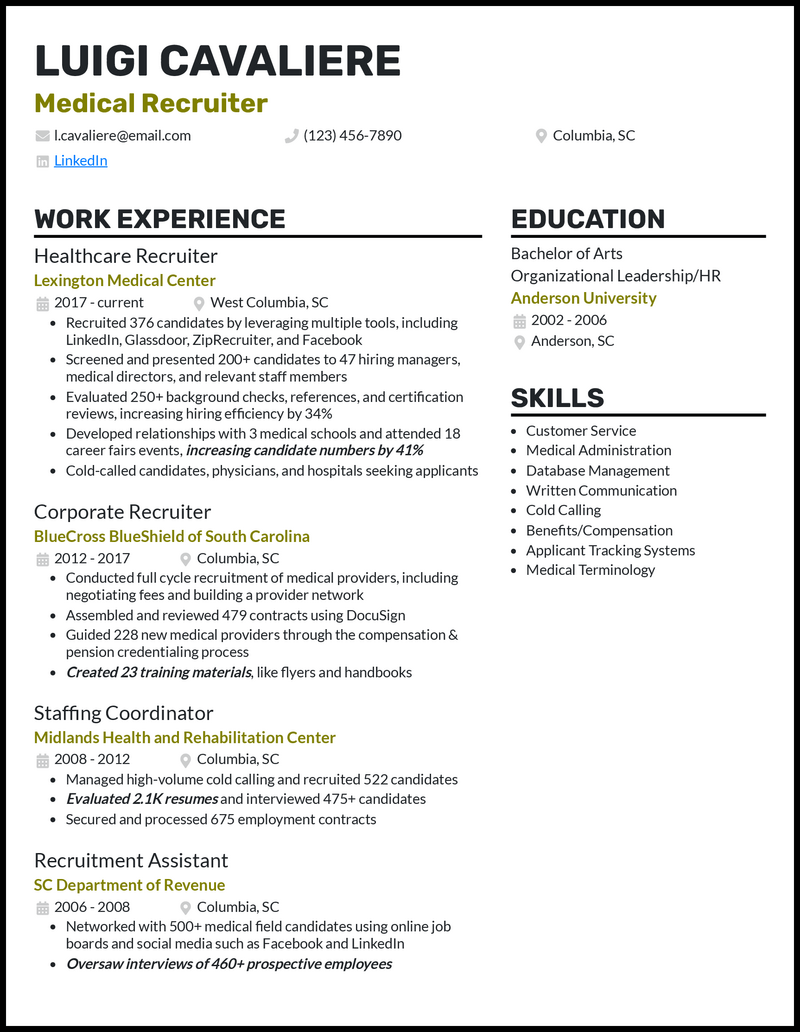You ensure that patients continue to receive optimal care by utilizing your own familiarity with the medical field to maintain a solid pipeline of excellent healthcare candidates. You evaluate applicants for each open position, gauging their qualifications against current regulations and verifying their credentials.
But while you might have a superb grasp on how to seek out top-tier medical employees, you may still have questions about your own resume. How long should it be? What should it look like?
Luckily, we’ve got three medical recruiter resume templates for you to try out so that you can find the best fit—plus some seasoned advice to get things rolling!
Copy this text for your medical recruiter resume!
Luigi Cavaliere
Medical Recruiter
[email protected]
(123) 456-7890
Columbia, SC
WORK EXPERIENCE
Healthcare Recruiter
Lexington Medical Center
2017 – current
West Columbia, SC
– Recruited 376 candidates by leveraging multiple tools, including LinkedIn, Glassdoor, ZipRecruiter, and Facebook
– Screened and presented 200+ candidates to 47 hiring managers, medical directors, and relevant staff members
– Evaluated 250+ background checks, references, and certification reviews, increasing hiring efficiency by 34%
– Developed relationships with 3 medical schools and attended 18 career fairs events, increasing candidate numbers by 41%
– Conducted cold calls to passive candidates, physicians, and
hospitals seeking candidates for open positions
Corporate Recruiter
BlueCross BlueShield of South Carolina
2012 – 2017
Columbia, SC
– Conducted full cycle recruitment of medical providers, including negotiating fees and building a provider network
– Assembled and reviewed 479 contracts using DocuSign
– Guided 228 new medical providers through the compensation & pension credentialing process
– Designed and created 23 employee training materials, including flyers, handbooks, and pamphlets
Staffing Coordinator
Midlands Health and Rehabilitation Center
2008 – 2012
Columbia, SC
– Managed high-volume cold calling and recruited 522 candidates
– Evaluated 2.1K resumes and interviewed 475+ candidates
– Secured and processed 675 employment contracts
Recruitment Assistant
SC Department of Revenue
2006 – 2008
Columbia, SC
– Networked with 500+ medical field candidates using online job
boards and social media such as Facebook and LinkedIn
– Oversaw interviews of 460+ prospective employees
– Screened 323 candidates, reviewed resumes, and coached
candidates on their strengths and weaknesses
SKILLS
– Customer Service
– Medical Administration
– Database Management
– Written Communication
– Cold Calling
– Benefits/Compensation
– Applicant Tracking Systems
– Medical Terminology
EDUCATION
Bachelor of Arts
Organizational Leadership/HR
Anderson University
2002 – 2006
Anderson, SC
Related resume examples
What Matters Most: Your Skills & Job Experience

Nothing says “qualified decision-maker” like an excellent skills list full of specialized abilities. As you already know from your own experiences in recruiting and medical settings, quality is generally better than quantity!
That means getting highly specific about your skills. Each item you put in the skills section of your resume should be clearly and closely related to your field. Prioritize abilities that are niche and specialized, like familiarity with medical terminology.
Avoid anything generic: If you’ve seen it on a bunch of resumes already, then it’s too vague for yours. You want to stand out as someone who knows ATS programs and profession-specific methodologies by name!
Consider these examples:
9 top medical recruiter skills
- Medical Administration
- Lever ATS
- Database Management
- Medical Terminology
- Benefits/Compensation
- Regulation Compliance
- Cold Calling
- Interviewing
- License Verification
Sample medical recruiter work experience bullet points
Now that you’ve laid your well-honed skill set out on the table, it’s time to show that you can use the tools at your disposal to produce top quality results. Other recruiters want to see solid examples of how you’ve contributed to improving the health care ecosystem!
You’ll want to include a progression of well-rounded examples of how you’ve obtained and retained awesome candidates. Show your prowess from start to finish by pulling in any relevant skills that didn’t mesh with your specialized list (like LinkedIn or Glassdoor) and sharing your results.
The best way for you to highlight your success points and milestones is through metrics. You’ll need to think of your client acquisitions and error reductions in numbers. Provide quantifiable data to back up your stories!
Here are some examples:
- Assembled and reviewed over 479 contracts using DocuSign, reducing error rates by 11%
- Guided 228 new medical providers through the compensation, pension, and credential verification process, earning a personal success rating of 96%
- Recruited 376 candidates by leveraging tools like LinkedIn, Facebook, ZipRecruiter, and Glassdoor to increase acquisition rates by 17%
- Developed relationships with 3 medical schools, gaining access to 18 career fairs and events and increasing candidate numbers by 41%
Top 5 Tips For Your Medical Recruiter Resume
- Be flexible
- Metrics really are important—and sometimes they’re hard to pin down just right. Whenever you can, try to avoid including “free-floating” numbers like headcounts, unless those headcounts really factor into the impressiveness of your end result (think time crunches and unusually speedy acquisition rates).
- Keep it understated
- A lot of recruiters feel tempted to get colorful with their resumes. And there’s nothing wrong with a bit of visual sparkle to set off your client acquisition agility. But remember that one resume you tried to read with four colors that totally overshadowed the information? Use that to learn what not to do!
- Don’t stray from your specialty
- While it’s always wise to appear well-rounded and versatile, carefully maintain a focus on your specific area of expertise. You’re in the medical field almost as much as you’re in the recruiting field! Don’t let your readers forget it.
- Make everything readable
- This one touches on a lot of areas: understated colors, easy-to-read fonts, and a well organized template. You know recruiters don’t initially have long to spend on each resume, so ensure that your tales of incredible medical hires are optimized for fast readability!
- Tailor your application to the job
- You know firsthand what a generic, “to whom it may concern” type of resume looks like, and you don’t want yours to be one. Revisit the job description and look for ways to reflect their wording and writing tone—show your due diligence, just as you would while verifying an applicant’s licensure.
Yes, definitely include your most relevant medical or HR degree(s) alongside any other related certifications you might have. If you have anything medical or leadership-related, these also enhance your credibility as a medical recruiter.
Keep your resume to one page or less, no matter how many awesome accomplishments you’ve racked up! It can be tough, but any extra interviewing experiences or retention achievements can find a home in your cover letter instead.
Just use whichever one makes your personal accomplishments look the best. As a medical recruiter, your experience is probably your shiniest section—so you’ll want to feature it front and center on your resume!








